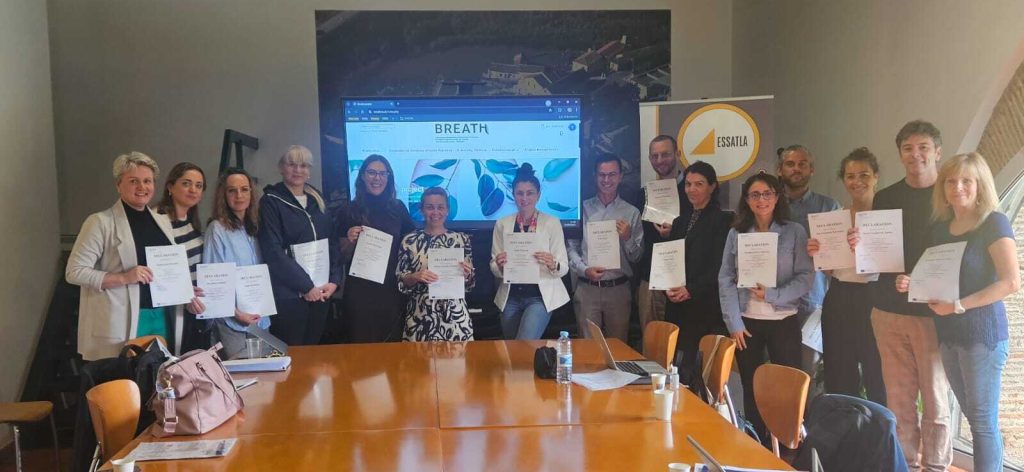The University of Cadiz has participated in a transnational meeting of the BREATH project (An European Collaborative and Innovative Partnership to Promote Physical Activity for Patients with Chronic Respiratory Conditions) in Lisbon, Portugal on 24-25 September 2024.
The BREATH project is a project of the Erasmus+ programme for cooperation partnerships in the field of higher education (Key Action 203). The universities participating in this project are, in addition to the University of Cadiz, the University of Opole (Poland), coordinator of the project, the University of Klaipeda (Lithuania), the University of Zadar (Croatia), the Superior School of Atlantic Health Sciences (Portugal) and the Italian company Pixel.
The meeting was attended by lecturers Alejandro Galán Mercant, Verónica Pérez Cabezas, Gloria González Medina and Inés Carmona Barrientos from the Faculty of Nursing and Physiotherapy, and the central themes of the project, related to the most prevalent chronic respiratory diseases (CKD), were discussed.
The project aims at developing rehabilitation programmes and plans, improving student training, postgraduate training, improving patient education, educating patients’ families and patient organisations, and improving patients’ quality of life, the main pillar being conservative interventions focusing on physical exercise.
The meeting reviewed the status of implementation of the different work packages. To date, the first two work packages, focused on the development of evidence-based content, have been completed. On the one hand, a synthesis of evidence has been developed, resulting in a comparative analysis of effective interventions for the target clinical population groups. This comparative analysis has been carried out on the basis of information located at national and international level, of evidence with indications of quality, published in leading scientific journals. On the other hand, in the last meeting, the second of the main results of the BREATH project was shared, which will be a reference book related to the central theme of the project, and which in the coming months will undergo an external evaluation by experts and clinicians who will assess the quality of the document.
In addition to the above, the working group is currently focusing on a second phase of the project, where a database of good clinical practices is being developed, as well as a virtual platform with free access, where people interested in the subject can find five didactic units with content related to CKD. Students interested in taking this online training will be able to undergo a process of continuous assessment of their progress and knowledge acquisition, and will subsequently receive a certificate of completion. The contents of the didactic units will be related to the content of the textbook, and will also be based on scientific evidence.
The outcome of this meeting has been satisfactory, with the project progressing favourably, with the planned deliverables having been met to date and the results of the first work packages being presented on the project’s website, which can be consulted at https://breath.ku.lt.
For 2025, the last phase of the project is planned, where mainly strategic actions will be developed to disseminate the contents of the project among the different interest groups.
The contribution of the University of Cadiz in this project is developed through the participation of two research groups (MOVE-IT: eMpOwering health by physical actiVity, Exercise and nutrITion and Fisioterapia de Salud of the Faculty of Nursing and Physiotherapy).
These UCA research groups, with a marked multidisciplinary character, have made a significant contribution to date to the BREATH project, related to the localisation of evidence on the management of patients with CKD: chronic obstructive pulmonary disease, lung cancer, asthma, cystic fibrosis, CoVID-19, etc. For the development of the contents of the University of Cadiz, we have had the support and collaboration of experts from the Spanish Society of Pneumology and Thoracic Surgery (SEPAR), who have highlighted the importance of the development of the BREATH project.
-
Comparison of local country contexts taking into account: epidemiology, National Health Service organisation, management, rehabilitation pathways and rehabilitation structures to verify the development of physical activity programmes for patients with respiratory failure and local unmet needs.
-
Creation of a database of good practices promoting physical activity inhibiting factors in patients with respiratory impairment.
-
Finally, the development of a distance learning platform for health and physical activity/sports professionals to help them organise physical activities with patients suffering from respiratory disorders and the digital platform for such distance learning is planned.


